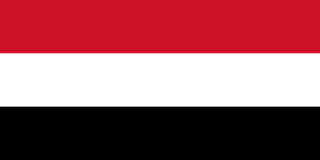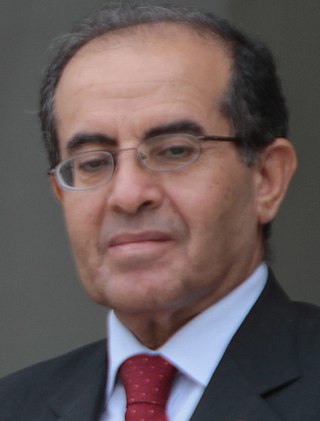Related Research Articles
Al-Saadi Muammar Gaddafi, also spelt as Al-Saadi Moammer Al-Gaddafi, is a Libyan retired professional football player. He captained the national team, but his career was widely attributed to the influence of his father Muammar Gaddafi, the country's leader at the time.

Saif al-Islam Muammar al-Gaddafi is a Libyan political figure. He is the second son of the late Libyan leader Muammar Gaddafi and his second wife Safia Farkash. He was a part of his father's inner circle, performing public relations and diplomatic roles on his behalf. He publicly turned down his father's offer of the country's second highest post and held no official government position. According to United States Department of State officials in Tripoli, during his father's reign, he was the second most widely recognized person in Libya, being at times the de facto prime minister, and was mentioned as a possible successor, though he rejected this. An arrest warrant was issued for him on 27 June 2011 by the International Criminal Court (ICC) for charges of crimes against humanity against the Libyan people, for killing and persecuting civilians, under Articles 7(1)(a) and 7(1)(h) of the Rome statute. He denied the charges.

Mohammed El Senussi is the son of Crown Prince Hasan as-Senussi of Libya, and of Crown Princess Fawzia bint Tahir Bakeer. Born in Tripoli, he is considered by Libyan royalists to be the legitimate heir to the Senussi Crown of Libya.
Abuzed Omar Dorda was a Libyan politician who was the General Secretary of the People's Committee of Libya from 7 October 1990 to 29 January 1994, and Libya's Permanent Representative to the United Nations from 1997 to 2003.

The Revolutionary Command Council was the twelve-person governing body that ruled the Libyan Arab Republic after the 1969 Libyan coup d'état by the Free Officers Movement. Its chairman was Muammar Gaddafi, who had the most influence and served as Libya's de facto head of state as Revolutionary Chairman of the Libyan Arab Republic and commander-in-chief of the armed forces. It was ideologically Arab nationalist, republican, anti-imperialist and pan-Arabist.

Mansour Rashid Kikhia was the Libyan Minister of Foreign Affairs (1972–1973), Libyan Ambassador to the United Nations, Permanent Libyan Representative to the United Nations (1975–1980), and later an opposition figure to Libya's leader Muammar Gaddafi, and human rights activist.

Moussa Muhammad El-Haj Nemr Koussa is a Libyan political figure and diplomat, who held several high-profile positions in the Libyan government, lastly as Minister of Foreign Affairs from March 2009, into the Libyan Civil War, when he resigned his position on 30 March 2011.

Umar Abdullah el-Muhayshi, also transliterated as Omar al-Meheshi, was a Libyan army officer and a member of the Libyan Revolutionary Command Council that ruled Libya after the 1969 Libyan coup d'état.

During the early stages of the Libyan Civil War of 2011, the Gaddafi regime was still in power: but there was widespread withdrawal of support from that regime by influential persons and organisations within the country. Among those who no longer supported the regime, the main concern they expressed was what they regarded as its use of excessive force against peaceful protestors. There were many resignations by ministers of the governing council and other senior officials, diplomats posted abroad, and senior military officers. Islamic clerics, tribal leaders, and members of the former royal family expressed their opposition, while the two leading Libyan oil companies also withdrew support for the regime.

The Libyan Civil War began on 17 February 2011 as a civil protest and later evolved into a widespread uprising. By mid-August, anti-Gaddafi forces effectively supported by a NATO-led international coalition were ascendant in Tripolitania, breaking out of the restive Nafusa Mountains in the south to mount an offensive toward the coast and advancing from Misrata on loyalist-held cities and villages from the north and east.

Mahmoud Jibril el-Warfally, also transcribed Jabril or Jebril or Gebril, was a Libyan politician who served as the interim Prime Minister of Libya for seven and a half months during the overthrow of Muammar Gaddafi and the Libyan Civil War, chairing the executive board of the National Transitional Council (NTC) from 5 March to 23 October 2011. He also served as the Head of International Affairs. As of July 2012, Jibril was the head of one of the largest political parties in Libya, the National Forces Alliance.

Moussa Ibrahim Gaddafi is a Libyan political figure who rose to international attention in 2011 as Muammar Gaddafi's Information Minister and official spokesman, serving in this role until the government was toppled in the Libyan Civil War. Ibrahim held frequent press conferences in the course of the war, denouncing rebel forces and the NATO-led military intervention, often in defiant and impassioned tones. His status and whereabouts remained unknown following the Battle of Tripoli in which the Gaddafi government was overthrown, although there were several claims and subsequent refutations of his capture. Eventually, in late 2014, it was discovered he was in Egypt before he was deported and fled to Serbia. On 12 January 2015 Moussa Ibrahim spoke publicly by video link at a political event hosted at the Committee Rooms Houses of Parliament, Westminster, London from an undisclosed location, also the Director of Private Security Company.

The foreign relations of Libya were largely reset at the end of the Libyan Civil War, with the overthrow of Muammar Gaddafi and the Second Libyan Civil War. The current Minister of Foreign Affairs since 15 March 2021 is Najla Mangoush. Although many foreign embassies in Tripoli closed down in 2014 due to the fighting, by the end of 2017 thirty diplomatic missions were reopened in the Libyan capital.

The 1969 Libyan revolution, al-Fateh Revolution or 1 September Revolution, was a coup d'état and revolution carried out by the Free Officers Movement, led by Colonel Muammar Gaddafi, which overthrew the Senussi monarchy of King Idris I and resulted in the formation of the Libyan Arab Republic.

Bashir Mohammad Massoud al-Rabiti is a Libyan politician.

The Popular Front for the Liberation of Libya is a Gaddafi loyalist militia and political party that aims to elect Saif al-Islam Gaddafi, son of the late Libyan leader Muammar Gaddafi, as president of Libya.
Tayeb el-Safi is a Libyan political operative. He briefly served as Minister of Economy & Trade and was one of the closest aides of former Libyan leader Muammar Gaddafi during the Libyan Civil War. In the 1980s, he had several international postings, primarily in Europe, at a time when many anti-Gaddafi dissidents were being assassinated extrajudicially abroad as a result of Gaddafi's "stray dog" policy.

Al-Khweldi Muhammad Salih Abdullah El-Hamedi, also transliterated as Khuwailidi al-Humaidi, was a Libyan Major General under Muammar Gaddafi, founding member of the Libyan Revolutionary Command Council, and the first Secretary General of the Libyan Popular National Movement. He was part of Gaddafi's inner circle.
Bashir Saghir Hawadi, also transliterated as Hawady or Houadi, is a Libyan major general who served under Muammar Gaddafi. He was among the twelve original members of the Libyan Revolutionary Command Council, the chief judge of the Libyan People's Court, and the General Secretary of the Arab Socialist Union.

Mustafa al-Kharoubi, also transliterated as Kharubi, was a Libyan general and politician under Muammar Gaddafi. He was part of Gaddafi's inner circle.
References
- 1 2 "Libya Names 12 Members Of Revolutionary Counci". The New York Times. 1970-01-11. ISSN 0362-4331 . Retrieved 2023-02-12.
- ↑ "COUNCIL IN LIBYA FORMS A CABINET". The New York Times. 1972-07-17. ISSN 0362-4331 . Retrieved 2023-02-12.
- ↑ "New Cabinet Meets". The New York Times. 1972-07-18. ISSN 0362-4331 . Retrieved 2023-02-12.
- 1 2 الوسط, بوابة. "عبدالمنعم الهوني يقدم أوراق ترشحه للرئاسة". Alwasat News (in Arabic). Retrieved 2023-02-13.
- 1 2 "Libya - Exiled Opposition". www.country-data.com. Retrieved 2023-02-12.
- 1 2 "Foreign Relations of the United States, 1969–1976, Volume E–9, Part 1, Documents on North Africa, 1973–1976 - Office of the Historian". history.state.gov. Retrieved 2023-02-12.
- 1 2 Refugees, United Nations High Commissioner for. "Refworld | Libya: Information on the Libyan National Democratic Forces, led by deposed prime minister Abdulmenam Elhuni, which reportedly operates mainly from England and Egypt". Refworld. Retrieved 2023-02-12.
- 1 2 CRS (2011-04-13). "Libya: Political Dynamics And Profiles – Analysis". Eurasia Review. Retrieved 2023-02-12.
- ↑ Murphy, Caryle (1993-12-14). "LIBYAN DISSIDENT MISSING IN CAIRO, FEARED ABDUCTED". Washington Post. ISSN 0190-8286 . Retrieved 2023-02-12.
- ↑ "Libya decries lack of Arab backing on Iraq". UPI. Retrieved 2023-02-12.
- ↑ Al-awsat, Asharq. "Middle-east Arab News Opinion". eng-archive.aawsat.com (in Ukrainian). Retrieved 2023-02-12.
- ↑ "Libya asks Arab League to cut Bulgaria ties-report". Reuters. 2007-07-27. Retrieved 2023-02-12.
- ↑ "Libya's representative to the Arab League resigns - Region - World". Ahram Online. Retrieved 2023-02-12.
- ↑ Sharrock, David (2011-02-26). "Gaddafi's defectors denounce 'government of Mussolini and Hitler'". The Observer. ISSN 0029-7712 . Retrieved 2023-02-12.
- ↑ Shenker, Jack; Cairo (2011-02-23). "Arab League urged to condemn Gaddafi by angry protesters in Egypt". The Guardian. ISSN 0261-3077 . Retrieved 2023-02-12.
- ↑ Al-awsat, Asharq. "Middle-east Arab News Opinion". eng-archive.aawsat.com (in Ukrainian). Retrieved 2023-02-12.
- ↑ Amos, Deborah (March 31, 2011). "In Egypt, Libyan Exiles Say Rebels Need Weapons". NPR .
- ↑ "Gadhafi: Leaders of airstrikes should go, not me". Deseret News. 2011-04-01. Retrieved 2023-02-12.
- ↑ Al-awsat, Asharq. "Middle-east Arab News Opinion". eng-archive.aawsat.com (in Ukrainian). Retrieved 2023-02-12.
- ↑ Al-awsat, Asharq. "Middle-east Arab News Opinion". eng-archive.aawsat.com (in Ukrainian). Retrieved 2023-02-12.
- ↑ "Whereabouts of Gaddafi are a mystery". Gulf Times. 2011-08-25. Retrieved 2023-02-12.
- ↑ Gladstone, Rick (2011-08-22). "Qaddafi's Whereabouts Still a Mystery as Rumors Swirl". The New York Times. ISSN 0362-4331 . Retrieved 2023-02-12.
- ↑ "Opposition council to take Libya's seat at the Arab League". Al Arabiya English. 2011-08-25. Retrieved 2023-02-12.
- ↑ "بالفيديو.. مبعوث ليبيا السابق بالأمم المتحدة يتهم "الهونى" بسرقة 17 مليون دولار". اليوم السابع (in Arabic). 2012-01-24. Retrieved 2023-02-13.
- ↑ الدباشي: عبد المنعم الهوني سارق.. , retrieved 2023-02-13
- ↑ "الخارجية الليبية تؤكد مجددا أن عبد المنعم الهونى لا يحمل صفة رسمية - بوابة الشروق". www.shorouknews.com (in Arabic). Retrieved 2023-02-13.
- ↑ "The High National Election Commission decides to exclude 25 candidates who it said have not met the criteria for running for post of president". lana.gov.ly. Retrieved 2023-03-21.




